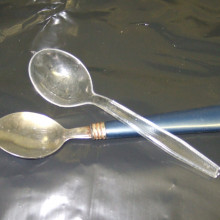Will your choice in cutlery alter how your food tastes??
Can the type of cutlery used to prepare and serve food really alter its flavour? And does it really change, or is it just our perception?
In this episode

00:00 - Does metallic cutlery affect perception of food taste?
Does metallic cutlery affect perception of food taste?
We put this to Professor Mark Miadovnich, from University College London...
Mark: - I've got some cereal here and I'm eating it with a silver spoon. I wasn't born with a silver spoon in my mouth, but I've since acquired some. There is a slight taste from the silver, as I expected because we actually did some experiments, making spoons of different materials- gold, silver, tin, copper, zinc, and stainless steel of course. We did blind taste tests with just the spoon alone and found that people are very sensitive to the different tastes of different metals. In fact, they can distinguish between them very clearly. They find them to be, to a greater or lesser extent, bitter, metallic, unpleasant is another adjective people use for some of these metallic tastes. And that, we found out in the end was due to something called the electrode potential of the metal. So its ability to react in the mouth and produce ions of a particular type - so in the case of a copper spoon, copper ions, and in the case of silver, silver ions. So, the least reactive metals are the ones we expect to taste least, and that's broadly what we found.
Hannah - So, metals produce ions in your mouth and the more reactive the metal, the stronger the taste produced. The alloy stainless steel actually produces the mildest taste. But do some foods taste better with different materials? Professor Zoe Laughlin from University College London led blind taste tests to find out.
Zoe - Specifically, for something like a boiled egg for example where the sulphur really reacts, a material like silver is really a bad idea because it tastes really foul, whereas gold is quite delicious. And then when it comes to sweet things, we actually found the strong taste of the copper and zinc made the sweetness of the food even stronger.
Hannah - And beyond chemistry, what else can alter your perception of taste? Back to Mark Miadovnich.
Mark - The size of the spoon, the shape of the spoon, the thermal conductivity, in this case it's conducting heat away from my tongue very quickly, so it's cool. If I start using a plastic spoon now, we're into a whole different ball game. And this is where this example of thinking about what spoon material you might use to eat caviar is quite an interesting one. Because actually, even if the material is chemically inert, like something like ivory, there are several differences in the way that heat is taken from your tongue and your mouth. The texture is very important, so wooden spoons tend to give a particular sensation in the mouth which can be both pleasant or unpleasant depending on who you are.









Comments
Add a comment